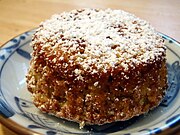Clementine cake is a cake flavored primarily with clementines. It may be topped with a sweet glaze or sauce, powdered sugar, honey and clementines, or candied clementines. It may originate from an orange cake in Sephardic cuisine. In popular culture, the cake played a minor part in the plot of the 2013 film The Secret Life of Walter Mitty.
 Clementine cupcake, cut open | |
| Type | Cake |
|---|---|
| Course | Dessert |
| Created by | Possibly originated from an orange cake developed by the Sephardi Jews |
| Serving temperature | Cold or warmed |
| Main ingredients | Clementine fruit and typical cake ingredients |
| Similar dishes | Fruitcake |
The cake is sometimes prepared using whole clementines in their peels, seeds and all, boiled.
Joyce Goldstein called it a classic. The Sydney Morning Herald called it famous.
Ingredients edit
Clementine cake is prepared with clementines, ground almonds or almond meal, flour, sugar, butter and eggs.[1][2] Optional ingredients include orange juice, orange muscat, milk, white dessert wine, or Riesling wine,[3][4] orange oil or tangerine oil (or both),[3] almond extract and vanilla extract.[3] Some variations exist, such as being prepared without the use of flour.[2][5]
Preparation edit
The cake can be prepared with clementines and/or clementine zest mixed in the batter,[1][6][7] with them atop the cake, such as in slices, and in both ways.[2] The seeds and membrane of the clementine can be removed as part of the preparation process,[2][4][8] or seedless clementines can be used.[9] Whole, sliced clementines including the peel,[1][10][11][12] or peeled clementines can be used,[8] and the clementines can be cooked before being used in the cake batter.[13] The fruit can be chopped or blended using a food processor.[13] Candied clementines can be used atop the cake or as a garnish.[3][2] The almonds used can be toasted or blanched.[3][9]
Clementine cake can be finished with a sweet topping such as a sugar or chocolate glaze,[2][14] a fudge or chocolate sauce,[6][15] powdered sugar or honey.[1][2][16] Clementine cake is dense and moist,[8][11][12] and its flavor may improve a day or more after preparation,[2][5][13][17] because the ingredients intermingle and coalesce to enhance its flavor as it ages. After being cooked, the cake may be delicate and can fall if it is wiggled too much.[10] After preparation, it can be frozen to preserve it.[18]
Variations edit
It can also be prepared as an upside-down cake.[19][20] Individual cupcakes are a common variation.
- A slice of vanilla clementine cake
- Vanilla clementine cake and cupcakes
- A slice of clementine cake
- Clementine cake
History edit

Clementine cake is probably related to a Sephardic orange cake.[7] Sephardic Jews popularized citrus cultivation in the Mediterranean region[21] in the 15th century and popularized the use of orange in baked goods. In addition to its Iberian flavors, the cake also has North African and Spanish roots.[22]
Claudia Roden, writing for The Guardian, said that she'd traced the evolution of the dish, which she describes as a Sephardic passover dish, "from Andalucia, through Portugal and Livorno in Italy, to Aleppo".[23] The New Yorker said that Roden's recipe had been adapted by so many other cook book writers that Roden had lost count.[24]
Recognition and importance edit
According to the San Francisco Chronicle, Joyce Goldstein called it a "classic Judeo-Spanish cake".[17] In 2020, Jill Dupleix, writing for the Sydney Morning Herald, called it "the now famous, never-bettered, flourless Sephardic cake".[25] Nigella Lawson called Roden's recipe "magnificent"[26] and created an adaptation.[2][5]
In popular culture edit
Clementine cake played a minor part in the plot of the 2013 film The Secret Life of Walter Mitty, and was included in the opening scene of the film and in a couple of additional scenes.[2][10]
See also edit
References edit
Further reading edit

- Willoughby, John (April 15, 2014). "In the Kitchen With Clémentine and Ruth". The New York Times. Retrieved December 4, 2015.









